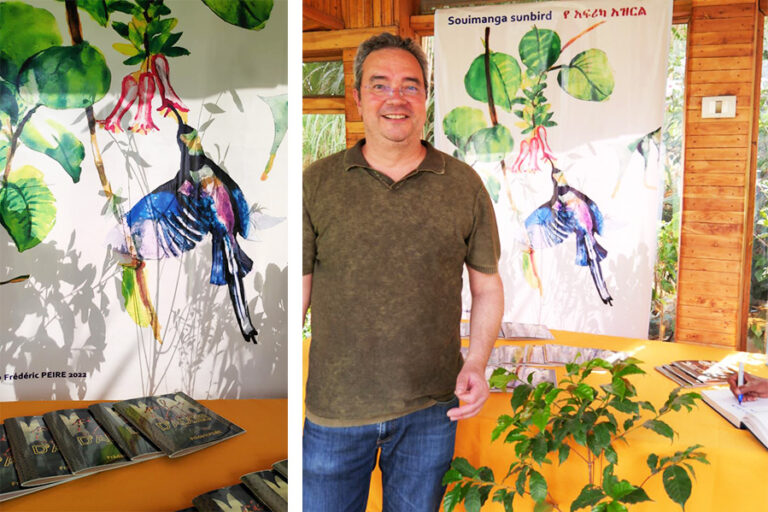A book called Piafs d’addis written by Fre’deric Peire has been officially launched on Sunday March 20, 2022 at Zoma Museum. The book narrates about birds of Ethiopia and their life.
Fre’deric Peire is a French artist based in Addis Ababa having more than 10 years of experience on the sector. The book is written both in French and in Amharic language.
In related news on March 20, 2022, the 12th round of international French language Day has been celebrated at the UN Economic commission for Africa. In 2010, the United Nations Department of Public Information officially launched French Language Day to celebrate multilingualism and cultural diversity. This day is used to promote the equal use of the six official languages of the United Nations: Arabic, Chinese, English, French, Russian and Spanish. There are more than 400 million speakers using this language on the five continents. The March 20 date is also recognized as the International Day of La Francophonie, which celebrates the anniversary of the Agency for Cultural and Technical Cooperation (ACCT), created on 20 March 1970. French is one of the two working languages of the United Nations.
Book depicting the life of Ethiopian birds’ launches, world celebrates French language day
Eurasia and the global economy
It is true that any financial turmoil in China can create turbulence around the world and even hit New York. According to economic analysts, China could have avoided certain obvious mistakes which many saw coming. What the episode shows is how the relative weights are shifting in the world way beyond just trade.
The recent World Bank data reveals that China still accounts for less than 15% of global GDP, but its contribution to global growth last year was in the range of 40%. So when China’s growth slackens, pretty much every one around the world feels it. Not surprisingly, therefore, people all over the world are concerned about China’s prospects.
In a bid to build global-Asia connectivity, President Xi Jinping took an initiative of “One Belt, One Road”. The initiative is of huge importance, not as an immediate plan, but as a long-term approach toward China’s development. To begin with, George Yeo, the former Foreign Affairs Minister of Singapore stated that China has all excess capacity in steel, cement, factories producing rolling stock and so on which can be applied to great use linking China to its neighbors. This growing connectivity of China to its neighbors deep into Eurasia is a story of epic proportions.
Three years ago, China established a rail link to the Persian Gulf via Kazakhstan, Turkmenistan and Iran. With the opening of Iran, the dynamics across a large part of Asia will change. Throughout history, Imperial China and Imperial Persia, two high civilizations, always had good relations maintaining peace in the region. China, ever a comprehensive, long-term planner, is proposing or already executing enormous railroad expansion to the Gulf of Thailand, to the Andaman Sea, to the Arabian Gulf, to the Black Sea, to the Baltic Sea and all the way to the North Sea.
Back in 2016 China and Russia agreed in principle to build a fast train connecting Moscow and Beijing probably through Kazakhstan. The distance between these two cities is 7,000 km, and the journey is supposed to take less than two days. But all these calculations about the economic feasibility change profoundly if, along the way, one builds a belt of cities. This is why the words “One Belt, One Road”, announced by President Xi first in Astana in October 2013, and then in Jakarta in November 2013, are far more than a slogan.
According to George Yeo, they represent a strategic reorientation. “One Belt, One Road” goes way beyond being a plan on paper. It is intended to create a huge flow, a 21st century revival of the old overland and maritime silk roads, and at the end to find all of Eurasia crisscrossed by connections. Using a biological metaphor, the growth of these connections is like angiogenesis in the human body. First the vessels grow, then logistics companies provide the blood circulation and development of organs follows.
George Yeo stated that Eurasia is a large part of the world, and it will, in a few decades from now, be the principal driver of the global economy. China knows that to improve the productivity of its real economy, it must deepen and liberalize its capital markets. Despite the recent financial turmoil, this strategic intent to deepen capital markets will not be deflected. The Chinese are now attempting to create two separate oceans of renminbi, one within China, which is the much larger one, and another outside China of which London is determined to be a major financial center.
An important question here is why can’t China allow the internationalization of other currencies like other major countries? To understand this we have to go back to the long history of China and the difficulty of governing a large part of the world’s population. Professor Jay Ogilvy of Yale University explained that whoever governs China must always be able to exercise some control over its own internal destiny. In the second half of the 19th century, after the second opium war, western customs officers inspected any ship landing on the China coast. Professor Jay Ogilvy noted that by the late Qing dynasty, China had lost control of its monetary system and therefore an important part of its sovereignty. China will not allow this again.
What about fears that China will go into recession? According to Professor Jay Ogilvy, this is not likely. He explained that China’s growth will slow down, maybe to 6%, or even 5.5%, but is now on a very high base of a GDP of about $10 trillion. That the slowdown in China is causing alarm around the world is because of the lack of aggregate demand powering the global economy. Despite easy money in the last seven years, the global economy has still not performed well. Central bankers fear that if they withdraw the liquidity, asset markets will implode, bubbles will burst, and the real economy will spiral downwards.
Fareed Zakaria in his 2003 published book entitled “The Future of Freedom”. stated that China is probably the only major country in the world today which is able to exercise a national will on a range of subjects. This is principally because the economy is still in a late adolescent phase and partly because the political culture over the centuries accepts centralized governance. For example, when President Xi promulgates “One Belt, One Road,” the message percolates right down and funds are allocated. The countries involved know it is credible because it is backed by a strong national will.
There is much talk about the South China Sea becoming a flashpoint. It is true that the South China Sea is important, but it is not the most important issue. It is a trial of strength between the United States and China but one which both sides will be careful not to mismanage. The most important issue is still the global economy, because if we get that wrong, everything else is in danger.
Muzikawi organizes its first digital music concert
Muzikawi a new Ethiopian music company that aims to take Ethiopian creatives to the global market, said it has organized its first digital concert.
“After two successful seasons we are back with an updated season of Live & Close Up. We give you seven full concerts of finest quality. Opening this season we have none other than Esubalew Yetayew (Yeshi) going live on Muzikawi’s YouTube Channel on April 6th 2022,” the company said in its press statement.
“This season’s artist line-up is curated by the renowned composer and musician Jorga Mesfin. With him he brought some of Ethiopia’s most established musicians to accompany the artists exclusively for Live & Close Up,” the statement further reads.
The statement noted that Muzikawi is built on 17 years of experience in Ethiopian music culture combined with 25 years of international music industry experience.
“Every week from April 1st and throughout 2022 we will present 16 artists and more than 100 releases,” the company stated.
The concept started as a remedy to the Covid-19 pandemic and its impact on the Ethiopian culture sector. A complete standstill of the local Ethiopian concert scene was one of the suffered consequences for both musicians and live audiences.
Muzikawi initiated Live & Close Up, a digital venue with doors open not only to Ethiopian music lovers but also to the world.






